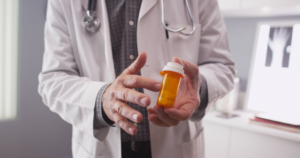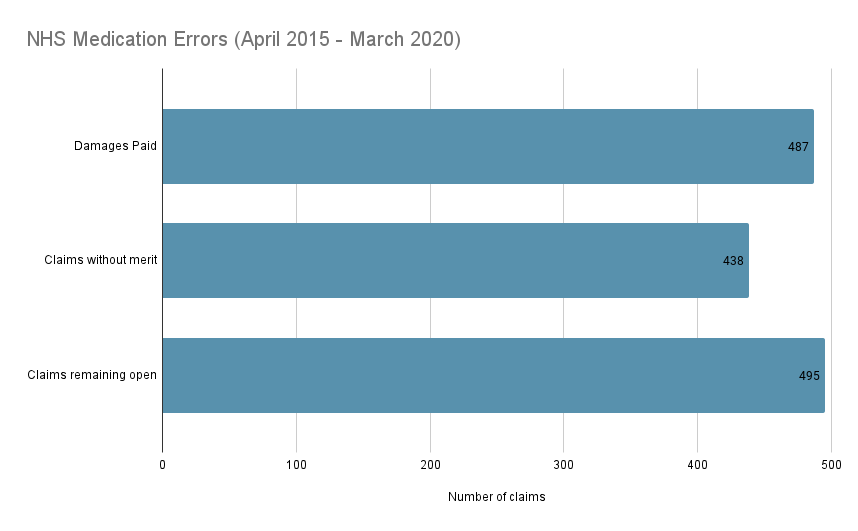In this guide, we will look at claiming if medication errors in the NHS were to cause harm. If you have suffered harm as a direct result of medical negligence, you could be entitled to claim compensation.

Medication Errors In The NHS – Could I Claim Compensation?
This guide will explain how to pursue a medical negligence claim. Furthermore, we will explain the steps you can take for a successful medical negligence claim and the potential compensation figures you could receive.
Additionally, you can contact our team today for further support. Our advisors are available to help you with any medical negligence queries you may have. They can also offer you free legal advice concerning your specific claim.
To speak with our advisors today:
- Call us: 0800 652 3087
- Connect with an advisor through the live chat
- Contact us via our online form.
Select A Section
- What Are Medication Errors In The NHS?
- Examples Of NHS Medication Errors
- What Injuries Or Illness Could Medication Errors Cause?
- Why Do You Need To Show The NHS Breached Their Duty Of Care?
- What Could You Claim For Medication Errors By The NHS?
- Why Contact A No Win No Fee Solicitor?
What Are Medication Errors In The NHS?
Medication errors are a kind of patient safety incident (PSI) that involves an error at any stage of prescribing, dispensing, preparing, administering or monitoring of medication. Different kinds of medical professionals could be responsible for a medication error, such as a nurse, doctor, GP, or pharmacist. They can also occur in various medical settings, including hospitals, A&E or a pharmacy.
However, in order to claim for a medication error, you must prove that you suffered harm due to a medical practitioner breaching their duty of care to you. We will discuss what this duty of care is in a later section.
If you’d like to know what steps can be taken after medication errors in the NHS, you can contact our team of advisors.
Medication Errors Statistics
In a report by the NHS Resolution, they stated that between April 2015 and March 2020, they received 1420 claims relating to medication errors. The chart below states what has happened with those claims.

Medication Errors in the NHS
Additionally, they reported that the total cost of closed claims equated to £19,324,495. Furthermore, £10,419,356 was paid in damages for closed claims.
The report also states that they aim to reduce severe and avoidable harm from NHS medication errors by 50% before March 2024.
Examples Of NHS Medication Errors
As we have previously stated, medication errors can occur in various different settings, and different kinds of medical professionals could be responsible for the error.
In order for your claim to be valid, you need to prove that you suffered harm due to a medical professional breaching their duty of care to you. All medical professionals have a responsibility to provide a minimum standard of care and prevent their patients from unnecessary harm.
If the care you receive is below this standard, and you’re caused unnecessary harm as a result, you could be entitled to claim.
There could be various different causes of medication errors, for example:
- Your GP fails to check what medication you are currently taking before prescribing your new medication. This means that the medication interacts and you become ill.
- A pharmacist gives you the wrong prescription due to mislabelling.
- A nurse gives you the wrong dosage of medication because they confused you with another patient.
If you’re still wondering “how could medication errors in the NHS potentially occur?”, speak with one of our advisors today. They can give you free legal advice.
What Injuries Or Illness Could Medication Errors Cause?
Medication errors can have different effects. For example, you could suffer extreme side effects from taking the wrong medication or not experience any harm at all. However, in order to claim it is essential that you experienced harm as the result of a negligent medication error, and that this would have been avoided if the correct level of care were provided.
Some examples of the harm you could endure due to a medication error could include:
- The medication you receive may contain something that you’re allergic to. If your doctor was aware of this allergy but prescribed you the medication anyway, you could suffer a severe allergic reaction.
- You could be given a different drug than the one that was intended for you. This medication means that your condition remains untreated and progresses to a point where you need surgery.
- A doctor may incorrectly administer a high dose of medication to you, which leads to an overdose. This could cause harm, such as organ failure and long-term respiratory problems.
If you were to suffer harm due to medication errors in the NHS, you might wonder whether you are eligible to make a medical negligence claim. Contact our team today for further information.
Why Do You Need To Show The NHS Breached Their Duty Of Care?
Regardless of whether they work in the public or private healthcare sector, all medical professionals must ensure that their patients are receiving the correct standard of care. This is their duty of care to you.
In order to make a claim, you must be able to prove medical negligence occurred. This means showing that:
- A medical professional owed you a duty of care.
- They breached this duty of care by acting negligently.
- This negligence caused you harm.
You can gather evidence to support your claim. Evidence can include:
- Your prescription form or your medical records, stating you were prescribed the wrong medication.
- Correspondence with the medical institution responsible for medical negligence.
- Proof that you suffered harm. This could be a copy of your medical records if you’ve had to seek medical attention for the effects of the error. It could also include any photographs of visible symptoms, such as rashes.
You may still be wondering, “how can medication errors in the NHS be proven?”; if so, you can speak with an advisor on our team for guidance.
What Could You Claim For Medication Errors By The NHS?
When making a medical negligence claim, there are two heads of compensation you could receive:
- General damages. – This aims to compensate you for the harm you have suffered due to medical negligence. You could provide evidence, such as your medical records, to help support your claim for general damages.
- Special damages. This aims to compensate you for any financial losses you have suffered due to being harmed by medical negligence. This includes travel costs to hospital appointments and loss of wages due to taking time off work to recover. You should provide evidence such as bank statements and receipts to receive special damages; without proof, you may not be fully compensated.
Legal professionals can use a document called the Judicial College Guidelines (JCG) when valuing various claims. For this reason, we have used the compensation brackets listed in the 16th edition of this document when creating the table below. We created this table to help you understand how much you could receive in general damages.
| Injury | Description | Amount |
|---|---|---|
| Kidney | (a) Serious damage that is permanent to both kidneys or they have been completely lost. | £169,400 to £210,400 |
| Bowels | (a) Double incontinence with medical complications including total loss of bowel function. | Up to £184,200 |
| Bowels | (b) The injured person may need to use a colostomy bag due to total loss of bowel function. | Up to £150,110 |
| Bowels | (c) Passive incontinence continues after surgery, causing embarrassment and other effects on the injured person's life. | In the region of £79,920 |
| Epilepsy | (a) Established Grand Mal | £102,000 to £150,110 |
| Epilepsy | (b) Established Petit Mal - How much is awarded will take into account the effects on daily life and any associated behavioral problems among other factors. | £54,830 to £131,370 |
| Chest Injury | (a) The injured person will suffer from serious and prolonged suffering due to severe damage to the heart or removal of one lung. | £100,670 to £150,110 |
| Chest Injury | (b) Injuries to the heart/chest/lungs causing physical disability, permanent damage and reduced life expectancy. | £65,740 to £100,670 |
| Chest Injury | (c) Some continuous disability due to damage to the chest and lungs. | £31,310 to £54,830 |
| Injury Resulting from Brain Damage | (e) Any brain damage will have been minimal. How much is awarded will take into account the initial injury's severity and the recovery period. | £2,210 to £12,770 |
You should only use this table as a guideline, as your potential settlement will vary based on the circumstances of your individual case.
Contact our team today for more information on compensation for medication errors in the NHS.
Why Contact A No Win No Fee Solicitor?
There are many benefits to being legally represented by a solicitor from our panel with a type of No Win No Fee agreement known as a Conditional Fee Agreement in place. With this type of agreement, you usually won’t have to pay for solicitor services if your claim is unsuccessful.
Additionally, you generally won’t have to pay them anything upfront to begin your claim. However, a legally-capped success fee will be deducted by your solicitor at the end of a successful claim for their services.
If you would like more information on No Win No Fee agreements or claims for medication errors in the NHS, contact us today. Our team of advisors are available to offer you free legal advice 24 hours a day, 7 days a week. They can also answer any questions you may have regarding medical negligence claims.
To speak with our advisors today:
- Call us: 0800 652 3087
- Connect with an advisor through the live chat
- Contact us via our online form.
Related Medication Error Guides
More of our guides can be seen below:
- Clinical And Medical Negligence Frequently Asked Questions
- Death Caused By The Wrong Medication – How Much Could You Claim?
- What To Do If A Pharmacy Gives The Wrong Medication In The UK
Further resources can be found at:
- Gov.uk – NHS Constitution for England
- NHS Resolution – Understanding the Clinical Negligence Scheme for General Practice
- General Medical Council (GMC) – The professional duty of candour
If you are still wondering, “could medication errors in the NHS be the basis of a claim?”, contact us today.
Guide by Jess/Megan
Published by Fern
